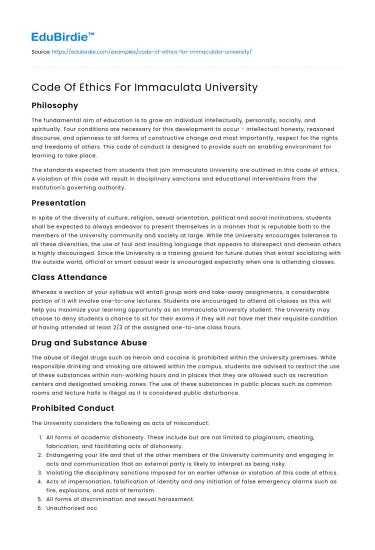Philosophy
The fundamental aim of education is to grow an individual intellectually, personally, socially, and spiritually. Four conditions are necessary for this development to occur - intellectual honesty, reasoned discourse, and openness to all forms of constructive change and most importantly, respect for the rights and freedoms of others. This code of conduct is designed to provide such an enabling environment for learning to take place.
The standards expected from students that join Immaculata University are outlined in this code of ethics. A violation of this code will result in disciplinary sanctions and educational interventions from the Institution's governing authority.
Save your time!
We can take care of your essay
- Proper editing and formatting
- Free revision, title page, and bibliography
- Flexible prices and money-back guarantee
Presentation
In spite of the diversity of culture, religion, sexual orientation, political and social inclinations, students shall be expected to always endeavor to present themselves in a manner that is reputable both to the members of the University community and society at large. While the University encourages tolerance to all these diversities, the use of foul and insulting language that appears to disrespect and demean others is highly discouraged. Since the University is a training ground for future duties that entail socializing with the outside world, official or smart casual wear is encouraged especially when one is attending classes.
Class Attendance
Whereas a section of your syllabus will entail group work and take-away assignments, a considerable portion of it will involve one-to-one lectures. Students are encouraged to attend all classes as this will help you maximize your learning opportunity as an Immaculata University student. The University may choose to deny students a chance to sit for their exams if they will not have met their requisite condition of having attended at least 2/3 of the assigned one-to-one class hours.
Drug and Substance Abuse
The abuse of illegal drugs such as heroin and cocaine is prohibited within the University premises. While responsible drinking and smoking are allowed within the campus, students are advised to restrict the use of these substances within non-working hours and in places that they are allowed such as recreation centers and designated smoking zones. The use of these substances in public places such as common rooms and lecture halls is illegal as it is considered public disturbance.
Prohibited Conduct
The University considers the following as acts of misconduct:
- All forms of academic dishonesty. These include but are not limited to plagiarism, cheating, fabrication, and facilitating acts of dishonesty.
- Endangering your life and that of the other members of the University community and engaging in acts and communication that an external party is likely to interpret as being risky.
- Violating the disciplinary sanctions imposed for an earlier offense or violation of this code of ethics.
- Acts of impersonation, falsification of identity and any initiation of false emergency alarms such as fire, explosions, and acts of terrorism.
- All forms of discrimination and sexual harassment.
- Unauthorized access to and spread of University material in any form; electronic or otherwise.
- Commission of offenses that are prohibited by the Federal, State and Local authorities.
Jurisdiction and Authority
Actions that will be taken under this students' code of conduct are administrative in nature and not criminal. Thus, students may likely find themselves liable to the University authority under this code even if their actions do not necessarily lead to criminal charges. Moreover, the University reserves the right to press charges against the student even if the public prosecutor has absolved them of the guilt of their act of misconduct and concluding that they do not warrant a criminal proceeding.
Explanation of Choice of Code
The rapid technological advancements in recent times have affected the lives of typical American students in several ways. With a Netflix account, for instance, a student can watch as many Hollywood movies as they want. Although most of these movies have aimed at entertaining and informing their audiences, most viewers have seemingly been drawn more to their negativities. The use of the f*** word and other cursing words have, for instance, tremendously proliferated amongst the young people in recent days. Others have emulated the skimpy dressing of some of the actors even when they are supposed to attend official functions. It, therefore, became crucial for me to provide guidance as far as communication and presentation are concerned in the above code of ethics.






 Stuck on your essay?
Stuck on your essay?

